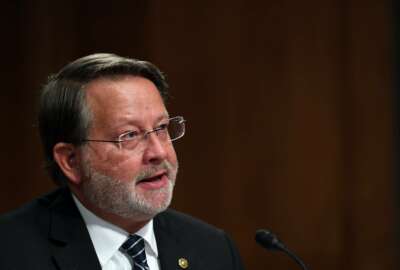First Look
GSA closes in on enterprisewide software deal with Microsoft
Laura Stanton, GSA’s assistant commissioner for the IT category, said GSA, OFPP have worked with agencies to come up with 24 standard terms and conditions.
CLARIFICATION: The story has been updated to make clear GSA isn’t creating a single contract, but a standard set of terms and conditions that agencies can use.
When the Office of Federal Procurement Policy launched its Better Contracting Initiative in November 2023, leaders promised this time would be different when it came to developing enterprisewide software licenses.
The General Services Administration is about to deliver on that promise.
GSA says its IT Vendor Management Office is close to finalizing a governmentwide set of terms and conditions with Microsoft for its software products. Each agency then can use those terms and conditions to create their own enterprisewide deal or in separate contracts.
Laura Stanton, GSA’s assistant commissioner for the IT category, wrote in a new blog posted today that an interagency team led by OFPP and GSA have come together on 24 standardized contract terms and conditions that agencies can use in their contracts.

“Over the course of several months, the ITVMO, the Office of Management and Budget and Microsoft’s federal division discussed the government’s requests and proposed additional ways to establish a strategic partnership,” Stanton wrote in the blog obtained by Federal News Network.
Recently, the government provided a detailed compendium of solutions for Microsoft to formally consider at the corporate level, as many of the items require updates to long-standing corporate policies. Considerations and discussions on the original 24 challenges are ongoing as of October 2024.”
Stanton said while the deal isn’t finalized, GSA, OFPP and Microsoft will finalize a path forward over the next few months.
“Throughout the project, Microsoft has acknowledged how implementing consistency across contracts between agencies and resellers would improve its performance as a product and service provider,” Stanton wrote. “Having spent the last six months working with Microsoft, the government is pleased with the emerging alliance. Clearly, both sides value the other as a critical partner, as demonstrated by the willing collaboration of the Governmentwide Microsoft Acquisition Strategy (GMAS) effort. The government is confident that this project will yield unprecedented success and pave the way for more strategic endeavors with other critical IT industry partners.”
The Government Accountability Office found last January that out of the 24 agencies they reviewed for software licenses management, Microsoft was the most common, with agencies reporting it 36 times for a total of about $2.4 billion in spending.
Time is right for software deals
OFPP released the BCI effort in 2023 with a several major goals, including resurrecting the enterprise software initiative.
The software license initiative for common titles builds off of experiences dating back to 2003, when the GSA launched the SmartBuy program, and 1999, when the Defense Department’s enterprise software initiative signed its first agreement.
While DoD has had limited success with its ESI, civilian agency efforts have mostly fallen flat.
But OFPP believes the time is ripe to reduce price variance, secure most favorable terms and conditions and improve the federal cyber posture.
“Currently, prices routinely vary up to 20% for the same software across agencies,” OMB wrote in its fact sheet about BCI in 2023. “Under the BCI, GSA will lead the government in negotiating a governmentwide IT software license agreement with a large software provider. This change will help to reduce price variance, secure more favorable terms and conditions, and capture 25% in efficiency gains, avoiding the wasted effort of having each agency individually plan, research and negotiate for the same common requirement.”
GSA’s optimism for this time is based on several factors. Stanton said the ITVMO started in 2023 with reviewing Microsoft contracts from each of the 24 Chief Financial Officers (CFO) Act agencies.
After compiling a list of 150-plus contract terms and conditions worthy of standardization and performing extensive price analysis that revealed substantial variance in pricing from resellers due to factors not always driven by “size of the prize,” the ITVMO hosted a Civilian Services Acquisition Workshop (C-SAW).
“Over two days, the group collaboratively concentrated the original list of terms and price reduction concepts down to 24. These 24 items comprised the foundation of the GMAS initiative,” Stanton wrote. “These contractual and price variances revealed an opportunity to capitalize on identified flexibilities, establishing best-in-class contract elements to apply to all government contracts.”
Congress paying more attention
Stanton said in a separate interview after speaking at the Coalition for Government Procurement fall conference on Nov. 20 that the ITVMO learned a lot from those previous efforts to establish enterprise software licenses. She said the planning and discussions to make sure the 24 CFO Act agencies were aligned is a big reason for this optimism.
“While I didn’t work on any of those previous initiatives myself, we certainly have talked to people who have. We looked at those lessons learned, and really looked at how do we move forward knowing how critical software is to how we function as a federal government,” she said. “This really just is category management in action when we look at the opportunity for the government to buy as a single enterprise.”
Microsoft is the first of what is expected to be many enterprisewide deals.
The Government Accountability Office found in January that 10 vendors, including Microsoft, Adobe, Salesforce and Oracle accounted for 73% of all licenses purchased by the 24 agencies reviewed.
“Although essential to effective management of licenses, selected agencies have not fully determined over- or under-purchasing of their five most widely used software licenses. Until agencies consistently track their software licenses that are currently in use and compare their inventories of software licenses with known purchases, they are likely to miss opportunities to reduce costs on duplicative or unnecessary licenses,” GAO stated in its report.
Additionally, OFPP and GSA should feel even more pressure to work on similar enterprisewide agreements with the House passing of the Strengthening Agency Management and Oversight of Software Assets (SAMOSA) Act. The bill calls for agencies to conduct an inventory and improve the overall management of software.
SAMOSA would build upon the 2016 MEGABYTE Act by requiring each agency to complete a comprehensive assessment of their software entitlements and software inventories which would be used to develop a plan for addressing costly, unnecessary licenses.
The Senate put SAMOSA on its calendar, but it’s unclear if it will come up for a vote.
Agencies initially found success with the MEGABYTE Act with the Senate Homeland Security and Governmental Affairs Committee determining in 2020 that 13 agencies saved or avoided spending more than $450 million between fiscal 2017 and 2019.
But over the last several years, agency attention to software licensing has fallen off, leading to more spending and underuse.
Copyright © 2025 Federal News Network. All rights reserved. This website is not intended for users located within the European Economic Area.
Jason Miller is executive editor of Federal News Network and directs news coverage on the people, policy and programs of the federal government.
Follow @jmillerWFED






